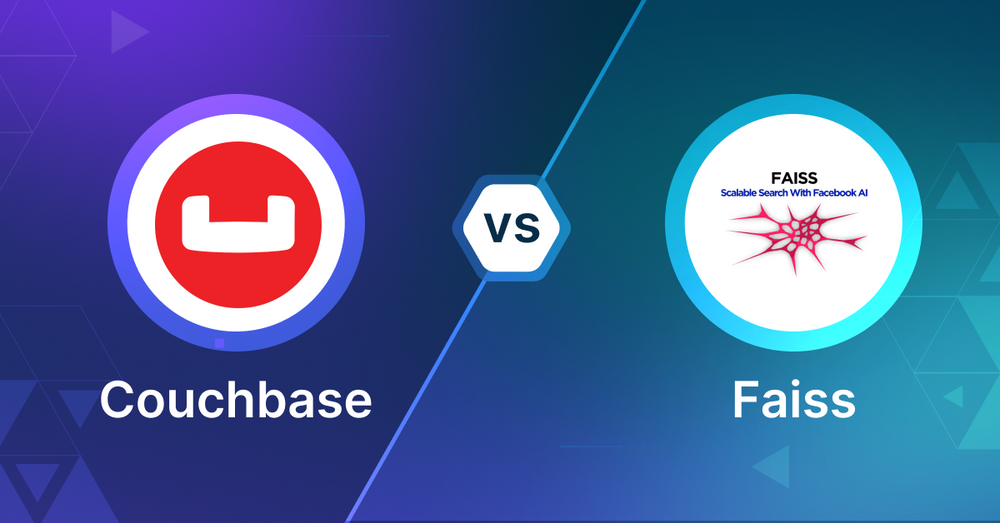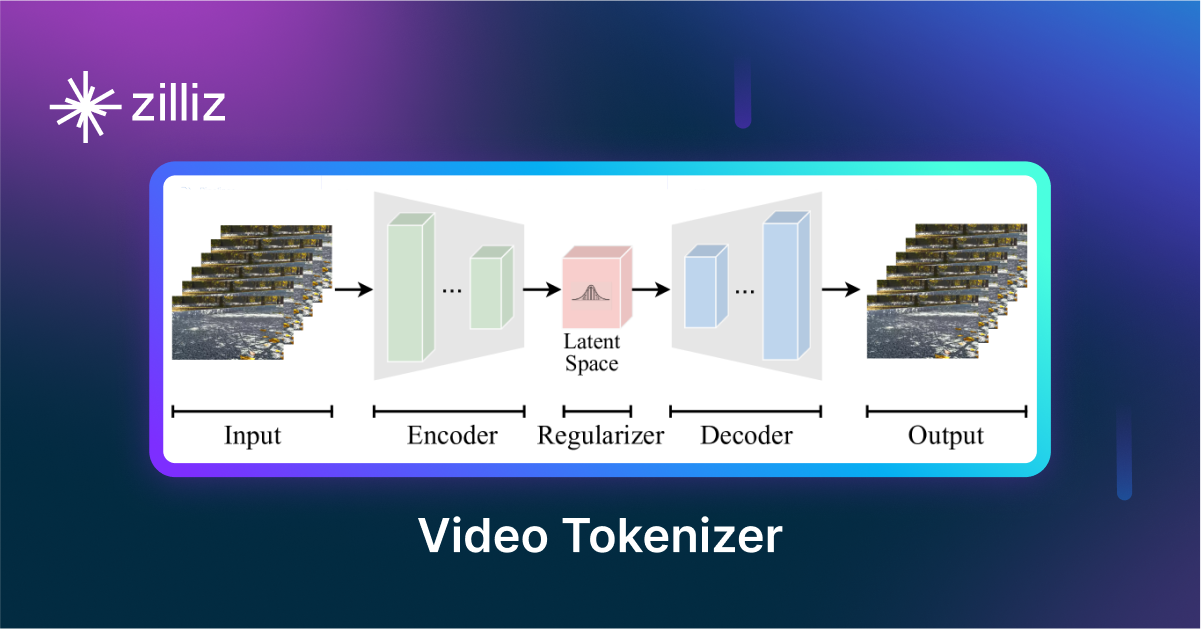Couchbase vs FAISS Choosing the Right Vector Database for Your AI Apps

What is a Vector Database?
Before we compare Couchbase and FAISS, let's first explore the concept of vector databases.
A vector database is specifically designed to store and query high-dimensional vectors, which are numerical representations of unstructured data. These vectors encode complex information, such as the semantic meaning of text, the visual features of images, or product attributes. By enabling efficient similarity searches, vector databases play a pivotal role in AI applications, allowing for more advanced data analysis and retrieval.
Common use cases for vector databases include e-commerce product recommendations, content discovery platforms, anomaly detection in cybersecurity, medical image analysis, and natural language processing (NLP) tasks. They also play a crucial role in Retrieval Augmented Generation (RAG), a technique that enhances the performance of large language models (LLMs) by providing external knowledge to reduce issues like AI hallucinations.
There are many types of vector databases available in the market, including:
- Purpose-built vector databases such as Milvus, Zilliz Cloud (fully managed Milvus)
- Vector search libraries such as Faiss and Annoy.
- Lightweight vector databases such as Chroma and Milvus Lite.
- Traditional databases with vector search add-ons capable of performing small-scale vector searches.
Couchbase is distributed multi-model NoSQL document-oriented database with vector search as an add-on and Faiss is an open-source, lightweight library built for efficient vector search. This post compares their vector search capabilities.
Couchbase: Overview and Core Technology
Couchbase is a distributed, open-source, NoSQL database that can be used to build applications for cloud, mobile, AI, and edge computing. It combines the strengths of relational databases with the versatility of JSON. Couchbase also provides the flexibility to implement vector search despite not having native support for vector indexes. Developers can store vector embeddings—numerical representations generated by machine learning models—within Couchbase documents as part of their JSON structure. These vectors can be used in similarity search use cases, such as recommendation systems or retrieval-augmented generation both based on semantic search, where finding data points close to each other in a high-dimensional space is important.
One approach to enabling vector search in Couchbase is by leveraging Full Text Search (FTS). While FTS is typically designed for text-based search, it can be adapted to handle vector searches by converting vector data into searchable fields. For instance, vectors can be tokenized into text-like data, allowing FTS to index and search based on those tokens. This can facilitate approximate vector search, providing a way to query documents with vectors that are close in similarity.
Alternatively, developers can store the raw vector embeddings in Couchbase and perform the vector similarity calculations at the application level. This involves retrieving documents and computing metrics such as cosine similarity or Euclidean distance between vectors to identify the closest matches. This method allows Couchbase to serve as a storage solution for vectors while the application handles the mathematical comparison logic.
For more advanced use cases, some developers integrate Couchbase with specialized libraries or algorithms (like FAISS or HNSW) that enable efficient vector search. These integrations allow Couchbase to manage the document store while the external libraries perform the actual vector comparisons. In this way, Couchbase can still be part of a solution that supports vector search.
By using these approaches, Couchbase can be adapted to handle vector search functionality, making it a flexible option for various AI and machine learning tasks that rely on similarity searches.
Faiss: Overview and Core Technology
Faiss (Facebook AI Similarity Search) is an open-source library developed by Meta (formerly Facebook) that provides highly efficient tools for fast similarity search and clustering of dense vectors. Faiss is designed for large-scale nearest-neighbor search and can handle both approximate and exact searches in high-dimensional vector spaces. Faiss is designed to handle enormous datasets and stands out for its ability to leverage GPU acceleration, providing a major boost in performance for large-scale applications. It is particularly well-suited for AI and machine learning applications.
Key Features of Faiss:
- Approximate and Exact K-Nearest-Neighbor Search (ANN & KNN): Faiss supports both approximate and exact nearest-neighbor (NN) searches. It allows you to trade off between speed and accuracy depending on your application's specific needs.
- GPU Acceleration: One of Faiss's standout features is its support for GPU acceleration. This allows it to scale effectively to large datasets and perform searches faster than CPU-only methods.
- Large Dataset Handling: Faiss is optimized for handling datasets that are too large to fit into memory. It uses various indexing techniques, such as inverted files and clustering, to organize data efficiently and perform searches on huge collections.
- Multiple Indexing Strategies: Faiss supports various methods for indexing vectors, such as flat (brute-force) indexing, product quantization, and hierarchical clustering. This provides flexibility in how searches are performed, depending on whether speed or accuracy is more important.
- Support for Distributed Systems: Faiss can perform searches across multiple machines in distributed systems, making it scalable for enterprise-level applications.
- Integration with Machine Learning Frameworks: Faiss integrates well with other machine learning frameworks, such as PyTorch and TensorFlow, making it easier to embed into AI workflows.
Key Differences
Here’s a comparison of Couchbase vs Faiss for vector search:
Purpose and Design
Couchbase is a general purpose NoSQL database that can be used for vector search, Faiss is built for vector similarity search. Couchbase requires workarounds to handle vectors, either through Full Text Search or application level calculations. Faiss has native vector operations with optimized algorithms.
Performance and Scalability
Faiss is better for pure vector search performance, especially with GPU acceleration. It can handle large scale nearest neighbor search through various indexing methods.
Couchbase’s vector search performance depends on the implementation approach. Using Full Text Search or application level calculations may not match Faiss’s specialized performance for large datasets.
Data Management
Couchbase has full database features: JSON document storage, indexing, querying, ACID transactions. It’s good when you need both vector search and traditional database operations.
Faiss only has vector operations. It doesn’t have database features - you’ll need separate storage for non-vector data.
Integration
Couchbase integrates with existing applications through multiple SDKs and REST APIs. It can work alongside vector libraries like Faiss.
Faiss works with ML frameworks like PyTorch and TensorFlow. Good for AI workflows but needs extra infrastructure for full database.
When to Choose Couchbase
Couchbase is best when you need a database that can do both traditional data operations and vector search, especially in enterprise environments where you have multiple data types and need ACID transactions, indexing and querying and vector search - it’s perfect for applications that need a single database rather than separate systems for different data operations.
When to Choose FAISS
Faiss is the clear winner for vector search only, especially in AI and machine learning applications where high performance similarity search is key - it’s the choice when your main focus is on vector operations, you need GPU acceleration for large scale search and you’re willing to do traditional database operations through separate systems.
Conclusion
So there you have it Your choice is simple: Couchbase is a full database with vector search, Faiss is specialized vector operations with GPU. Decide based on whether you want an all-in-one database (Couchbase) or maximum vector search (Faiss) and your existing infrastructure, scale requirements and how important vector search is in your app.
Read this to get an overview of Couchbase and FAISS but to evaluate these you need to evaluate based on your use case. One tool that can help with that is VectorDBBench, an open-source benchmarking tool for vector database comparison. In the end, thorough benchmarking with your own datasets and query patterns will be key to making a decision between these two powerful but different approaches to vector search in distributed database systems.
Using Open-source VectorDBBench to Evaluate and Compare Vector Databases on Your Own
VectorDBBench is an open-source benchmarking tool for users who need high-performance data storage and retrieval systems, especially vector databases. This tool allows users to test and compare different vector database systems like Milvus and Zilliz Cloud (the managed Milvus) using their own datasets and find the one that fits their use cases. With VectorDBBench, users can make decisions based on actual vector database performance rather than marketing claims or hearsay.
VectorDBBench is written in Python and licensed under the MIT open-source license, meaning anyone can freely use, modify, and distribute it. The tool is actively maintained by a community of developers committed to improving its features and performance.
Download VectorDBBench from its GitHub repository to reproduce our benchmark results or obtain performance results on your own datasets.
Take a quick look at the performance of mainstream vector databases on the VectorDBBench Leaderboard.
Read the following blogs to learn more about vector database evaluation.
Further Resources about VectorDB, GenAI, and ML
- What is a Vector Database?
- Couchbase: Overview and Core Technology
- Faiss: Overview and Core Technology
- Key Differences
- When to Choose Couchbase
- When to Choose FAISS
- Conclusion
- Using Open-source VectorDBBench to Evaluate and Compare Vector Databases on Your Own
- Further Resources about VectorDB, GenAI, and ML
Content
Start Free, Scale Easily
Try the fully-managed vector database built for your GenAI applications.
Try Zilliz Cloud for FreeKeep Reading

The Real Bottlenecks in Autonomous Driving — And How AI Infrastructure Can Solve Them
Autonomous driving is data-bound. Vector databases unlock deep insights from massive AV data, slashing costs and accelerating edge-case discovery.

VidTok: Rethinking Video Processing with Compact Tokenization
VidTok tokenizes videos to reduce redundancy while preserving spatial and temporal details for efficient processing.

Optimizing Embedding Model Selection with TDA Clustering: A Strategic Guide for Vector Databases
Discover how Topological Data Analysis (TDA) reveals hidden embedding model weaknesses and helps optimize vector database performance.
The Definitive Guide to Choosing a Vector Database
Overwhelmed by all the options? Learn key features to look for & how to evaluate with your own data. Choose with confidence.